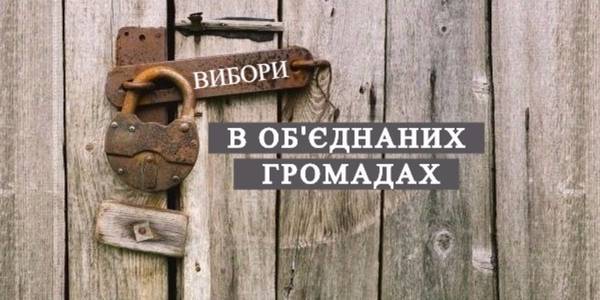CEC found possibility not to appoint elections in amalgamated hromadas
On 9 August, the Central Election Commission decided to appeal to the Verkhovna Rada Committee on Legal Policy and Justice on providing explanations regarding the legislative regulation of organisation and procedure for holding all-Ukrainian and local referendums in Ukraine, possibility of appointing the first and additional local elections under the procedure prescribed by the law without holding a local referendum on support of the voluntary amalgamation of hromadas, voluntary accession to AH, and, if necessary, introduction of appropriate amendments to the legislation to remove legal conflicts and inconsistencies.
According to the CEC, the need for this appeal is justified by the fact that the Law of Ukraine “On All-Ukrainian Referendum” was recognised as unconstitutional by the Constitutional Court of Ukraine on 26 April 2018. Consequently, in the opinion of the CEC, there was a legal uncertainty as to the effect of the 1991 Law of Ukraine “On All-Ukrainian and Local Referendums”, which was abolished by the abovementioned law.
“In turn, in case of restoration of the Law of Ukraine “On All-Ukrainian and Local Referendums”, certain issues of voluntary amalgamation of hromadas of villages, urban-type settlements, cities, and voluntary accession to amalgamated hromadas can refer to the list of issues that, according to Part 2 of Article 6 of the mentioned law, are resolved solely by the local referendum,” the CEC believes.
Getting explanation of the parliamentary committee takes time. And the decision to hold the first elections in AHs on 28 October, as planned, should be adopted by the Central Election Commission no later than 17 August. Consequently, holding elections in AHs in October is a big question.
It should be noted that Olha Lebedynska, expert of the analytical and legal group of the Central Reform Office under MinRegion explained that the decision of the Constitutional Court of Ukraine in question in no way affects the decision of the CEC to appoint the first elections to the newly formed AHs.
She reminded that the abolition of the legislative act by a new law is a one-off action, which is implemented at the moment of the entry into force of the new law.
The decision of the Constitutional Court of Ukraine (CCU) No. 4-r/2018 dated 26 April 2018 recognises the Law of Ukraine “On All-Ukrainian Referendum” (No. 5475) as unconstitutional. According to Article 152 of the Constitution of Ukraine, the laws, other acts or their certain provisions, declared unconstitutional, lose validity from the date of adoption of the decision on their unconstitutionality by the Constitutional Court.
Pursuant to Articles 147-153 of the Constitution of Ukraine and the Law of Ukraine “On the Constitutional Court of Ukraine”, the CCU is not empowered to restore the laws of Ukraine, that were abolished by legislative acts as those, recognised unconstitutional by this court, and that lost their validity in this regard.
According to Article 19 of the Constitution of Ukraine, state and local self-government bodies, as well as their officials, are obliged to act only on the basis, within the powers and in the manner, provided by the Constitution and laws of Ukraine.
Thus, it is possible to state that at present the method of implementation of the provisions of Articles 69-70, 72-74 of the Constitution of Ukraine is not stipulated by the law, and there is a lack of legal regulation of both all-Ukrainian referendums since 2018 and of local ones from 2012, respectively.
It should be borne in mind that absence of such legislative norms does not preclude the implementation of other legislative acts that envisage resolution of certain issues either by another method, established by such a law, or by holding a respective referendum as an appropriate alternative.
Such legislative acts include the laws of Ukraine “On Local Self-Government in Ukraine”, “On the Rules of Procedure of the Verkhovna Rada of Ukraine” and “On Voluntary Amalgamation of Hromadas”.
In accordance with the provisions of Article 129 of the Rules of Procedure of the Verkhovna Rada of Ukraine, following the consideration of the draft law in the third reading, the Verkhovna Rada may adopt, among other options, a decision approving the text of the draft law as a whole and passing it on an all-Ukrainian referendum. The lack of legislative regulation of the procedures for holding an all-Ukrainian referendum does not deprive the Verkhovna Rada of the possibility to adopt the Law in any other way. Thus, over the period from 27 April 2018 – when the Law of Ukraine “On All-Ukrainian Referendum” was declared unconstitutional, the Verkhovna Rada of Ukraine, according to information on its portal, has adopted 33 laws, including the Laws “On the Supreme Anti-Corruption Court” and “On National Security of Ukraine” .
The Law of Ukraine “On Voluntary Amalgamation of Hromadas” (Parts 5, 7, Article 7, and Part 1, Article 8) envisages alternative options for making a decision on the voluntary amalgamation of hromadas, both through decisions made by the relevant councils and through holding of a local referendum. The lack of a legislative settlement of the referendum procedures does not deprive the hromada of the possibility to express its will in another way, envisaged by the legislation, that is, by adopting a decision on amalgamation by the relevant council.
It should be noted that since the enactment of the Law of Ukraine “On Voluntary Amalgamation of Hromadas” in March 2015 until now, 668 amalgamated hromadas have been formed. At the same time, the relevant law on conducting local referendums was abolished in 2012, even before the adoption of the Law of Ukraine “On Voluntary Amalgamation of Hromadas.

Tags:
elections amalgamation of hromadas CEC
Source:
Прес-центр ініціативи «Децентралізація»

Share the news:
18 July 2025
Вакансія: Експерт (ка) для перегляду РПУВ
Вакансія: Експерт (ка) для перегляду РПУВ
Avfall Sverige та SALAR International оголошують вакансію «Експерт для перегляду РПУВ» до програм «WM4U: Посилення...
18 July 2025
Запрошуємо громади до партнерства для...
Шведсько-українська програма Polaris «Підтримка багаторівневого врядування в Україні» запрошує громади до...
18 July 2025
Lviv Urban Forum 2025: одинадцять підсумків головної урбан-події України
Lviv Urban Forum 2025: одинадцять підсумків...
Lviv Urban Forum — це найбільша в Україні щорічна платформа для обговорення міських викликів, урбанізму та...
18 July 2025
Occupiers persecute local self-government: Ukrainian community leaders remain in captivity
Occupiers persecute local self-government:...
Since the outbreak of the full-scale invasion, the Russian Federation has been systematically persecuting...
